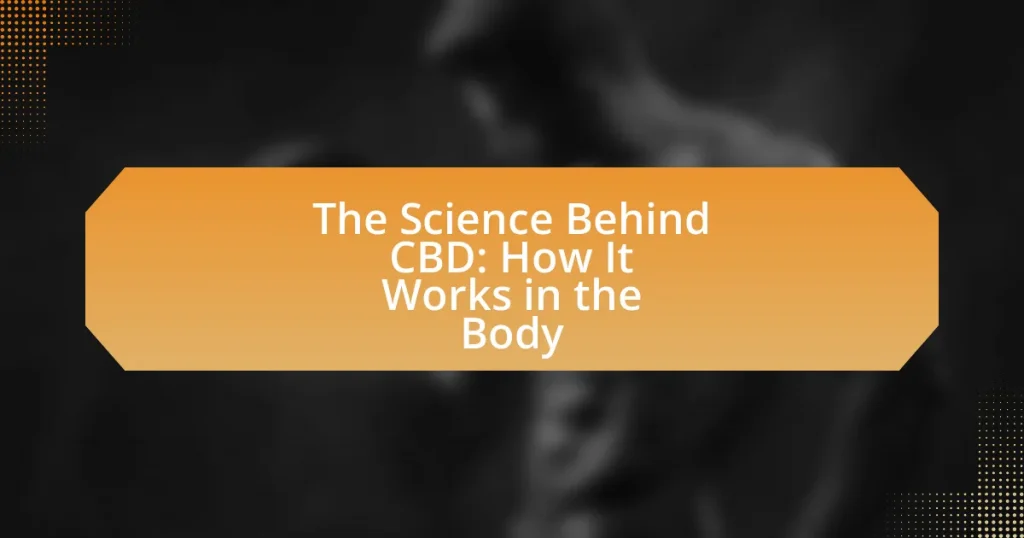CBD products, derived from the cannabis plant, contain cannabidiol, a non-psychoactive compound recognized for its therapeutic benefits, particularly in athletic recovery and performance enhancement. This article explores the various forms of CBD available to athletes, including oils, capsules, and topicals, and discusses how these products can aid in reducing inflammation, alleviating pain, and improving sleep quality. Additionally, it examines the extraction processes that influence product quality, the physiological benefits of CBD for muscle recovery, and the legal considerations athletes must navigate when using CBD. The article also highlights best practices for selecting and incorporating CBD into an athlete’s routine to maximize its effectiveness while ensuring safety and compliance with sports regulations.

What are CBD Products and How Do They Relate to Athletic Recovery and Performance?
CBD products are derived from the cannabis plant and contain cannabidiol, a non-psychoactive compound known for its potential therapeutic benefits. These products, including oils, capsules, and topical creams, are increasingly used by athletes to aid in recovery and enhance performance. Research indicates that CBD may help reduce inflammation, alleviate pain, and improve sleep quality, all of which are crucial for athletic recovery. A study published in the Journal of Pain Research found that CBD significantly reduced pain and improved sleep in participants, suggesting its efficacy in recovery protocols for athletes. Additionally, CBD’s anxiolytic properties may help athletes manage performance anxiety, further supporting their overall performance.
What is CBD and how is it derived?
CBD, or cannabidiol, is a non-psychoactive compound found in the cannabis plant, primarily derived from hemp. It is extracted through various methods, including CO2 extraction, which uses carbon dioxide to isolate the compound while preserving its purity and potency. This extraction process is widely recognized for producing high-quality CBD oil, which contains beneficial cannabinoids and terpenes. Studies indicate that CBD may offer anti-inflammatory and analgesic properties, making it potentially beneficial for athletes in recovery and performance enhancement.
What are the different forms of CBD available for athletes?
The different forms of CBD available for athletes include oils, capsules, edibles, topicals, and vape products. CBD oils are often used for their quick absorption and ease of dosage, while capsules provide a convenient and consistent way to consume CBD. Edibles, such as gummies, offer a tasty alternative but may take longer to take effect. Topicals, like creams and balms, are applied directly to the skin for localized relief, making them popular for muscle soreness. Vaping allows for rapid delivery of CBD into the bloodstream, although it may not be suitable for all athletes. Each form serves distinct purposes, catering to various preferences and needs in recovery and performance enhancement.
How does the extraction process affect the quality of CBD products?
The extraction process significantly affects the quality of CBD products by determining the purity, potency, and overall effectiveness of the final product. Different extraction methods, such as CO2 extraction, ethanol extraction, and oil infusion, yield varying levels of cannabinoids and terpenes, which are crucial for the therapeutic benefits of CBD. For instance, CO2 extraction is known for producing high-quality CBD oil with minimal residual solvents, ensuring a cleaner product that retains a broader spectrum of beneficial compounds. In contrast, less sophisticated methods may leave behind impurities or degrade the cannabinoids, resulting in lower quality and efficacy. Studies have shown that products derived from superior extraction techniques often exhibit higher bioavailability, enhancing their effectiveness for athletes seeking recovery and performance benefits.
How can CBD enhance recovery for athletes?
CBD can enhance recovery for athletes by reducing inflammation and alleviating pain, which are critical factors in post-exercise recovery. Research indicates that CBD interacts with the endocannabinoid system, potentially modulating pain perception and inflammatory responses. A study published in the Journal of Pain Research found that CBD significantly reduced pain and improved recovery times in subjects with exercise-induced muscle damage. Additionally, CBD may promote better sleep quality, which is essential for recovery, as sleep plays a vital role in muscle repair and overall athletic performance.
What are the physiological benefits of CBD for muscle recovery?
CBD offers several physiological benefits for muscle recovery, including reduced inflammation, pain relief, and improved sleep quality. Research indicates that CBD interacts with the endocannabinoid system, which plays a crucial role in regulating inflammation and pain perception. A study published in the Journal of Pain Research found that CBD significantly reduced inflammation and pain in animal models, suggesting its potential effectiveness for muscle recovery in athletes. Additionally, CBD may enhance sleep quality, which is vital for recovery, as adequate sleep is linked to improved muscle repair and growth.
How does CBD impact inflammation and pain management?
CBD reduces inflammation and aids in pain management by interacting with the endocannabinoid system, which plays a crucial role in regulating pain and immune responses. Research indicates that CBD can inhibit the production of pro-inflammatory cytokines and promote the release of anti-inflammatory mediators, thereby alleviating pain associated with conditions like arthritis and muscle soreness. A study published in the European Journal of Pain demonstrated that CBD applied topically significantly reduced pain and inflammation in animal models, supporting its potential effectiveness in managing pain for athletes.
What role does CBD play in improving athletic performance?
CBD plays a role in improving athletic performance primarily by reducing inflammation and pain, which can enhance recovery times and overall physical endurance. Research indicates that CBD interacts with the endocannabinoid system, potentially leading to decreased muscle soreness and improved sleep quality, both of which are crucial for athletes. A study published in the Journal of Pain Research found that CBD significantly reduced pain and inflammation in subjects, supporting its use for recovery in athletic contexts. Additionally, CBD’s anxiolytic properties may help athletes manage performance anxiety, further contributing to improved performance outcomes.
How can CBD influence focus and mental clarity during competition?
CBD can enhance focus and mental clarity during competition by interacting with the endocannabinoid system, which plays a role in regulating mood, stress, and cognitive function. Research indicates that CBD may reduce anxiety and improve overall mental state, allowing athletes to concentrate better on their performance. A study published in the Journal of Psychopharmacology found that CBD significantly reduced anxiety in participants, suggesting its potential to help athletes maintain composure and focus under competitive pressure. This ability to mitigate anxiety can lead to improved decision-making and performance during high-stakes situations.
What are the potential effects of CBD on endurance and stamina?
CBD may enhance endurance and stamina by reducing exercise-induced inflammation and pain, which can lead to improved performance. Research indicates that CBD has anti-inflammatory properties that may help athletes recover faster and maintain higher levels of physical activity. A study published in the Journal of Pain Research found that CBD can significantly reduce pain and inflammation, potentially allowing athletes to train longer and more effectively. Additionally, CBD may help with anxiety and stress management, which can further contribute to improved endurance during physical activities.

What Types of CBD Products are Best for Athletes?
The best types of CBD products for athletes include CBD oils, capsules, topicals, and edibles. CBD oils are favored for their quick absorption and ease of dosage, making them effective for immediate relief from pain and inflammation. Capsules offer a convenient and consistent dosage, ideal for athletes who prefer a straightforward method of consumption. Topicals, such as creams and balms, are applied directly to the skin, providing targeted relief for sore muscles and joints without entering the bloodstream. Edibles, like gummies, provide a longer-lasting effect, suitable for sustained relief during extended training sessions. These products have been shown to help reduce inflammation, alleviate pain, and improve recovery times, which are crucial for athletic performance.
What are the most popular CBD products used by athletes?
The most popular CBD products used by athletes include CBD oils, CBD capsules, CBD topicals, and CBD edibles. CBD oils are favored for their quick absorption and ease of dosage, allowing athletes to manage pain and inflammation effectively. CBD capsules offer a convenient and precise way to consume CBD, making them a preferred choice for those who want a consistent dosage. CBD topicals, such as creams and balms, are applied directly to the skin to target localized pain and soreness, providing relief without systemic effects. Lastly, CBD edibles, like gummies, are popular for their taste and ease of use, offering a discreet way to incorporate CBD into an athlete’s routine. These products are widely recognized for their potential benefits in recovery and performance enhancement, supported by anecdotal evidence from athletes across various sports.
How do topical CBD products differ from ingestible forms?
Topical CBD products differ from ingestible forms primarily in their method of application and absorption. Topical CBD is applied directly to the skin, targeting localized areas for relief, while ingestible forms, such as oils or capsules, are consumed and metabolized through the digestive system, affecting the entire body. Research indicates that topical applications can provide localized effects without entering the bloodstream, making them suitable for targeted relief of muscle soreness or joint pain, whereas ingestibles offer systemic effects that may take longer to manifest but can provide broader benefits, such as anxiety reduction or overall wellness support.
What are the advantages of using CBD oils versus capsules?
CBD oils offer faster absorption and more flexible dosing compared to capsules. The sublingual application of oils allows for quicker entry into the bloodstream, often resulting in effects within 15 to 30 minutes, while capsules typically take longer to digest and metabolize, delaying their effects. Additionally, oils can be easily adjusted in dosage, allowing users to find their optimal amount more precisely, whereas capsules come in fixed doses, limiting customization. This flexibility and rapid onset make CBD oils particularly advantageous for athletes seeking immediate relief or support during recovery and performance.
How should athletes choose the right CBD product for their needs?
Athletes should choose the right CBD product by assessing their specific needs, such as recovery, pain relief, or anxiety management. They should consider factors like the product’s formulation, concentration of CBD, and third-party lab testing for quality assurance. Research indicates that CBD can aid in reducing inflammation and pain, which is crucial for recovery; a study published in the Journal of Pain Research found that CBD significantly reduced pain in subjects with chronic pain conditions. Additionally, athletes should ensure the product complies with sports regulations to avoid disqualification.
What factors should be considered when selecting a CBD dosage?
When selecting a CBD dosage, factors such as body weight, individual tolerance, the condition being treated, and the method of consumption should be considered. Body weight influences how CBD is metabolized; generally, individuals with higher body weight may require a larger dosage. Individual tolerance varies significantly, as some people may respond well to lower doses while others may need more to achieve the desired effects. The specific condition being treated also plays a crucial role; for instance, chronic pain may require a different dosage compared to anxiety relief. Lastly, the method of consumption affects bioavailability; for example, oils and tinctures typically provide faster effects compared to edibles. These considerations are supported by research indicating that personalized dosing based on these factors can enhance the effectiveness of CBD (Source: “Cannabidiol in inflammatory bowel diseases: a brief overview,” authors: R. M. Izzo et al.).
How can athletes ensure the quality and safety of CBD products?
Athletes can ensure the quality and safety of CBD products by selecting products that have undergone third-party testing for potency and contaminants. Third-party testing provides an unbiased verification of the product’s contents, ensuring that it contains the advertised amount of CBD and is free from harmful substances such as pesticides, heavy metals, and solvents. According to a study published in the Journal of the American Medical Association, many CBD products on the market do not contain the levels of CBD they claim, highlighting the importance of verifying product quality through independent testing. Additionally, athletes should look for products with a Certificate of Analysis (COA) from a reputable lab, which confirms the product’s safety and efficacy.

What Are the Legal and Safety Considerations for Athletes Using CBD?
Athletes using CBD must navigate both legal and safety considerations. Legally, the World Anti-Doping Agency (WADA) has removed CBD from its list of prohibited substances, allowing athletes to use it without risking sanctions, provided it contains less than 0.3% THC, which is the legal limit in many jurisdictions. Safety considerations include potential side effects such as fatigue, changes in appetite, and interactions with other medications, which athletes should discuss with healthcare professionals. Additionally, the lack of regulation in the CBD market means athletes must ensure they are using products that are third-party tested for purity and potency to avoid contamination or mislabeling.
What are the current regulations regarding CBD use in sports?
The current regulations regarding CBD use in sports allow athletes to use CBD products, as it is not classified as a prohibited substance by the World Anti-Doping Agency (WADA). WADA removed CBD from its list of banned substances in 2018, recognizing its potential therapeutic benefits. However, athletes must be cautious, as THC, the psychoactive component of cannabis, remains prohibited in competition. This distinction is crucial, as products labeled as CBD may still contain THC, which could lead to positive drug tests and sanctions.
How can athletes verify if a CBD product is compliant with sports regulations?
Athletes can verify if a CBD product is compliant with sports regulations by checking for third-party lab testing and ensuring the product is free from banned substances. Third-party lab testing provides an unbiased analysis of the product’s contents, confirming that it meets the standards set by organizations like the World Anti-Doping Agency (WADA). Additionally, athletes should look for products that contain less than 0.3% THC, as this is the legal limit in many jurisdictions and aligns with WADA guidelines.
What potential side effects should athletes be aware of when using CBD?
Athletes should be aware that potential side effects of using CBD include fatigue, changes in appetite, diarrhea, and potential interactions with other medications. Research indicates that CBD can cause drowsiness in some individuals, which may impact athletic performance. Additionally, a study published in the journal Cannabis and Cannabinoid Research found that gastrointestinal issues, such as diarrhea, were reported by some users. Furthermore, CBD may interact with certain medications by affecting liver enzymes, which could alter the effectiveness of those medications.
How can athletes mitigate the risks associated with CBD use?
Athletes can mitigate the risks associated with CBD use by selecting high-quality, third-party tested products and consulting with healthcare professionals. High-quality CBD products ensure that athletes are consuming products free from contaminants and accurately labeled for cannabinoid content, which is crucial for maintaining compliance with sports regulations. Consulting with healthcare professionals allows athletes to receive personalized advice based on their health status and performance goals, reducing the likelihood of adverse effects. Research indicates that proper dosing and understanding individual responses to CBD can further minimize risks, as highlighted in studies examining the safety profiles of cannabinoids in athletic populations.
What are some best practices for incorporating CBD into an athlete’s routine?
To effectively incorporate CBD into an athlete’s routine, athletes should start with a low dosage and gradually increase it while monitoring their body’s response. This approach allows athletes to identify the optimal dosage that provides benefits such as reduced inflammation and improved recovery without adverse effects. Research indicates that CBD may help alleviate pain and anxiety, which can enhance performance and recovery. A study published in the Journal of Pain Research found that CBD significantly reduced pain in participants, supporting its use for athletes seeking relief from exercise-induced discomfort. Additionally, athletes should choose high-quality, third-party tested CBD products to ensure purity and potency, further enhancing the effectiveness of their routine.



